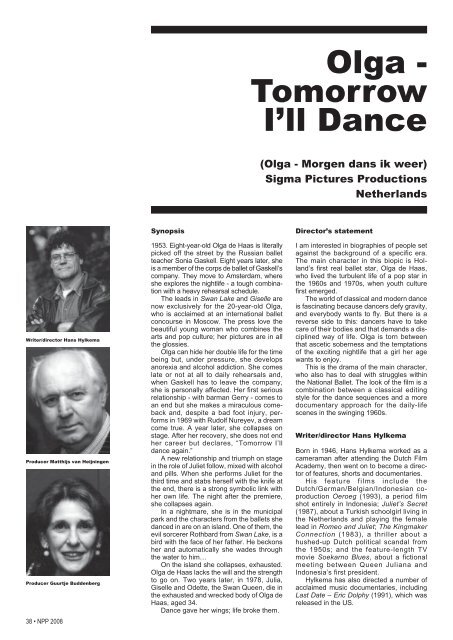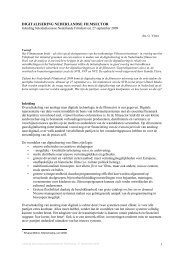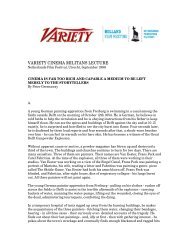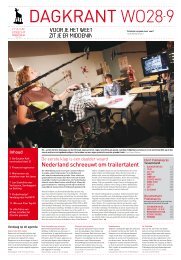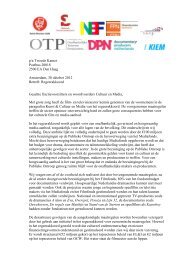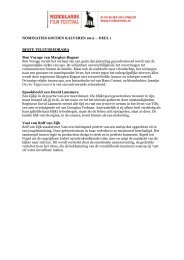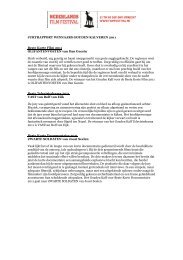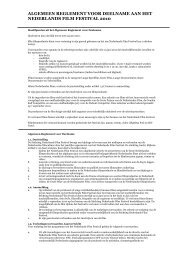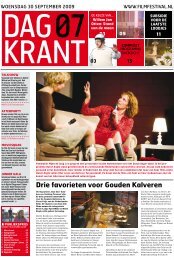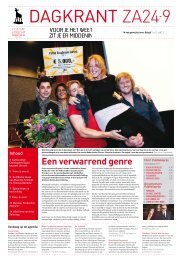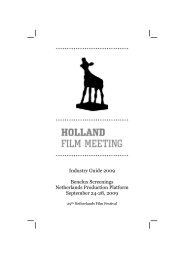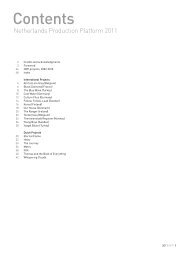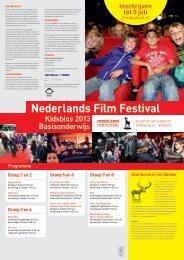Netherlands Production Platform - Nederlands Film Festival
Netherlands Production Platform - Nederlands Film Festival
Netherlands Production Platform - Nederlands Film Festival
Create successful ePaper yourself
Turn your PDF publications into a flip-book with our unique Google optimized e-Paper software.
Olga -<br />
Tomorrow<br />
I’ll Dance<br />
(Olga - Morgen dans ik weer)<br />
Sigma Pictures <strong>Production</strong>s<br />
<strong>Netherlands</strong><br />
Writer/director Hans Hylkema<br />
Producer Matthijs van Heijningen<br />
Producer Guurtje Buddenberg<br />
38 • NPP 2008<br />
Synopsis<br />
1953. Eight-year-old Olga de Haas is literally<br />
picked off the street by the Russian ballet<br />
teacher Sonia Gaskell. Eight years later, she<br />
is a member of the corps de ballet of Gaskell’s<br />
company. They move to Amsterdam, where<br />
she explores the nightlife - a tough combination<br />
with a heavy rehearsal schedule.<br />
The leads in Swan Lake and Giselle are<br />
now exclusively for the 20-year-old Olga,<br />
who is acclaimed at an international ballet<br />
concourse in Moscow. The press love the<br />
beautiful young woman who combines the<br />
arts and pop culture; her pictures are in all<br />
the glossies.<br />
Olga can hide her double life for the time<br />
being but, under pressure, she develops<br />
anorexia and alcohol addiction. She comes<br />
late or not at all to daily rehearsals and,<br />
when Gaskell has to leave the company,<br />
she is personally affected. Her first serious<br />
relationship - with barman Gerry - comes to<br />
an end but she makes a miraculous comeback<br />
and, despite a bad foot injury, performs<br />
in 1969 with Rudolf Nureyev, a dream<br />
come true. A year later, she collapses on<br />
stage. After her recovery, she does not end<br />
her career but declares, “Tomorrow I’ll<br />
dance again.”<br />
A new relationship and triumph on stage<br />
in the role of Juliet follow, mixed with alcohol<br />
and pills. When she performs Juliet for the<br />
third time and stabs herself with the knife at<br />
the end, there is a strong symbolic link with<br />
her own life. The night after the premiere,<br />
she collapses again.<br />
In a nightmare, she is in the municipal<br />
park and the characters from the ballets she<br />
danced in are on an island. One of them, the<br />
evil sorcerer Rothbard from Swan Lake, is a<br />
bird with the face of her father. He beckons<br />
her and automatically she wades through<br />
the water to him…<br />
On the island she collapses, exhausted.<br />
Olga de Haas lacks the will and the strength<br />
to go on. Two years later, in 1978, Julia,<br />
Giselle and Odette, the Swan Queen, die in<br />
the exhausted and wrecked body of Olga de<br />
Haas, aged 34.<br />
Dance gave her wings; life broke them.<br />
Director’s statement<br />
I am interested in biographies of people set<br />
against the background of a specific era.<br />
The main character in this biopic is Holland’s<br />
first real ballet star, Olga de Haas,<br />
who lived the turbulent life of a pop star in<br />
the 1960s and 1970s, when youth culture<br />
first emerged.<br />
The world of classical and modern dance<br />
is fascinating because dancers defy gravity,<br />
and everybody wants to fly. But there is a<br />
reverse side to this: dancers have to take<br />
care of their bodies and that demands a disciplined<br />
way of life. Olga is torn between<br />
that ascetic soberness and the temptations<br />
of the exciting nightlife that a girl her age<br />
wants to enjoy.<br />
This is the drama of the main character,<br />
who also has to deal with struggles within<br />
the National Ballet. The look of the film is a<br />
combination between a classical editing<br />
style for the dance sequences and a more<br />
documentary approach for the daily-life<br />
scenes in the swinging 1960s.<br />
Writer/director Hans Hylkema<br />
Born in 1946, Hans Hylkema worked as a<br />
cameraman after attending the Dutch <strong>Film</strong><br />
Academy, then went on to become a director<br />
of features, shorts and documentaries.<br />
His feature films include the<br />
Dutch/German/Belgian/Indonesian coproduction<br />
Oeroeg (1993), a period film<br />
shot entirely in Indonesia; Juliet’s Secret<br />
(1987), about a Turkish schoolgirl living in<br />
the <strong>Netherlands</strong> and playing the female<br />
lead in Romeo and Juliet; The Kingmaker<br />
Connection (1983), a thriller about a<br />
hushed-up Dutch political scandal from<br />
the 1950s; and the feature-length TV<br />
movie Soekarno Blues, about a fictional<br />
meeting between Queen Juliana and<br />
Indonesia’s first president.<br />
Hylkema has also directed a number of<br />
acclaimed music documentaries, including<br />
Last Date – Eric Dolphy (1991), which was<br />
released in the US.


